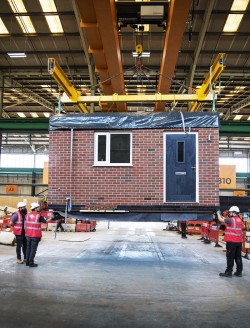Some of the UK’s first mainstream modular zero carbon homes have been unveiled with the promise of zero bills, saving consumers £1,000 a year.
Housing is responsible for more than a quarter of the UK’s carbon emissions. Last year, only 1.6% of newbuilds in the UK were built to the top standard of energy-efficiency, equivalent to just 3,457 homes.
Currently, like electric vehicles (EVs) and most green technology, zero carbon homes cost a bit more than standard fossil fuel heated homes because of the cost of installing additional insulation, heat pumps and solar panels but also as incentives are still provided to developers from gas network providers. Factory manufactured homes create less waste and are more thermally efficient because many of the components come pre-assembled or are cut and manufactured using robots. Having already trialled zero carbon homes for five councils and housing associations, Yorkshire-based ilke Homes is now rolling out a mainstream zero carbon home to help investors go green.
ilke Homes says that the small cost premium will be eradicated totally by 2030 thanks to reductions in key component costs and advances in its manufacturing processes, robotics and AI-driven design. This means investors and housing associations will not have to pay more for a zero carbon home while consumers living in an ilke ZERO house will pay nothing for energy, saving nearly £1,000 a year on bills.
ilke Homes is calling on its partners, its supply chain and the wider construction industry, to work together to speed up delivery. As has occurred with EVs, collaboration between parts manufacturers and Government incentives have significantly brought down the cost of materials and ensured more skilled engineers have been trained up. Like a car chassis, with manufacturers like Audi, VW, SEAT and Skoda using the same chassis for different types of vehicle, modular homes can be specified for a range of price points using the same base. This means that there is an opportunity to find significant efficiencies through scaling up manufacturing.
“Government is rightly pushing construction to drag itself into the 21st century and we need to replicate the successes seen with solar, wind and EVs where industry came together, drove down costs and drove up skills,” says Dave Sheridan, Executive Chairman at ilke Homes. “We’ve spent years investing in our factory and this mainstream zero-carbon home is a great example of how the private sector can respond to politicians’ net zero pledges. There’s a huge opportunity here to tackle fuel poverty while helping investors meet their green targets. But we need our supply chain and our partners to work with us. Driving down the cost depends on scale and equally, we need to act now.
“Building zero-carbon homes now will pay off very quickly, because very soon councils, housing associations and homeowners will face carbon taxes and stare down the barrel of huge retrofit costs which can all be avoided. Low-carbon technologies are improving all the time but while some firms claim we don’t have enough of the right skills to build zero carbon homes en masse now, we believe that these are the very vested interests that have held back construction over the decades.”
As well as tackling the climate crisis, given homes built to ilke ZERO specifications will see households potentially pay nothing for their energy, these homes could play a key role in reducing fuel poverty. ilke ZERO is able to achieve a zero carbon specification by:
• Fabric: A home’s walls, floors and roofs are highly insulated, while all windows and doors are incredibly airtight. This helps ensure heat does not escape and stops draughts. Being manufactured in a factory - as opposed to a field - means everything can be done at higher quality
• Efficiency: Highly efficient LED lighting that use less than a quarter of the energy of a halogen bulb is incorporated into the design, as well efficient water fittings and ventilation systems
• Renewable energy: Fossil-fuel gas boilers are replaced by low-carbon air source heat pumps that use a third of the energy. In addition, solar panels, that now cost less than traditional roof tiles, generate more electricity than a house requires, providing free energy for consumers and income from exported electricity
Mark Farmer, the Government’s Champion for modern housebuilding, said: “The Government continues to be highly supportive of modern methods of construction (MMC) and as efforts ramp up to meet the UK's net-zero carbon targets by 2050, it’s going to be vitally important that the house building industry delivers more energy-efficient housing to avoid costly retrofitting programmes later down the line. Achieving this will require a greater focus on high quality factory-based production.”
Mike De’Ath, Partner at architecture firm HTA Design, adds: “Manufacturing homes in factories is the only way we can decarbonise housing stock, at scale, and we have to do this if we’re to stand a chance of meeting our obligations. Like the Model 3, ilke ZERO could be a Tesla moment as there’s significant demand for a mainstream, zero carbon home. What’s critical now is that we have the right policies and incentives to encourage the right skills and technology to be developed so that all modular manufacturers and developers can benefit and work collaboratively to reduce the impact of housing on the environment.”
For more information visit: www.ilkehomes.co.uk









